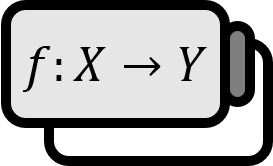Generating Functions of Legendre Polynomials
Theorem
The generating function of Legendre polynomials is as follows.
$$ \Phi (x,t) = \frac{1}{\sqrt{1-2xt+t^{2}}} = \sum \limits_{l=0}^{\infty}P_{l}(x)t^{l},\quad |t|<1 $$
Description
The generating function of Legendre polynomials is, put simply, a polynomial that has the Legendre polynomial $P_{l}(x)$ as its coefficients.
Lemma
The function $\Phi (x,t) = \dfrac{1}{\sqrt{1-2xt+t^{2}}}$ is a solution to the differential equation below.
$$ \begin{equation} (1-x^{2})\frac{ \partial ^{2} \Phi}{ \partial x^{2} }-2x\frac{ \partial \Phi}{ \partial x }+t\frac{ \partial ^{2}}{ \partial t^{2} }(t\Phi) = 0 \end{equation} $$
Proof
Since it can be easily shown by simply differentiating and adding, detailed computation and explanation are omitted.
$$ \frac{ \partial \Phi}{ \partial x }=t(1-2xt+t^{2})^{-\frac{3 }{2}} $$
$$ \frac{ \partial ^{2}\Phi}{ \partial x^{2} }=3t^{2}(1-2xt+t^{2})^{-\frac{5 }{2}} $$
$$ \frac{ \partial }{ \partial t }(t\Phi)=(1-2xt+t^{2})^{-\frac{1}{2}}-(t^{2}-xt)(1-2xt+t^{2})^{-\frac{3 }{2}} $$
$$ \frac{ \partial ^{2}}{ \partial t^{2} }(t\Phi)=-(3t-2x)(1-2xt+t^{2})^{-\frac{3}{2}}+3(t^{3}-2xt^{2}+x^{2}t)(1-2xt+t^{2})^{-\frac{5}{2}} $$
Therefore,
$$ \begin{align*} &(1-x^{2})\frac{ \partial ^{2} \Phi}{ \partial x^{2} }-2x\frac{ \partial \Phi}{ \partial x }+t\frac{ \partial ^{2}}{ \partial t^{2} }(t\Phi) \\ &= 3(t^{2}-x^{2}t^{2})(1-2xt+t^{2})^{-\frac{5 }{2}}-2xt(1-2xt+t^{2})^{-\frac{3 }{2}} \\ & -(3t^{2}-2xt^{2})(1-2xt+t^{2})^{-\frac{3}{2}}+3(t^{4}-2xt^{3}+x^{2}t^{2})(1-2xt+t^{2})^{-\frac{5}{2}} \\ &= -3t^{2}(1-2xt+t^{2})^{-\frac{3}{2}}+3t^{2}(1-2xt+t^{2})(1-2xt+t^{2})^{-\frac{5}{2}} \\ &= -3t^{2}(1-2xt+t^{2})^{-\frac{3}{2}}+3t^{2}(1-2xt+t^{2})^{-\frac{3}{2}} \\ &= 0 \end{align*} $$
■
Proof
To show that $\Phi(x, t) = \dfrac{1}{\sqrt{1-2xt+t^{2}}}$ is the generating function of Legendre polynomials, according to the definition of generating functions, it suffices to express $\Phi(x, t)$ as a polynomial in $t$, and verify that the coefficients are Legendre polynomials. First, substituting with $y \equiv 2xt - t^{2}$,
$$ \begin{align*} \Phi(y) &= \dfrac{1}{\sqrt{1 - y}} \\ &= (1-y)^{-\frac{1}{2}}. \end{align*} $$
$$ (1 - x)^{-\alpha} = 1 + \alpha x + \dfrac{\alpha(\alpha+1)}{2!} x^{2} + \dfrac{\alpha(\alpha+1)(\alpha+2)}{3!} x^{3} + \cdots $$
Then, by the formula for the negative binomial series, it is as follows.
$$ \begin{align*} \Phi(y) &= (1-y)^{-\frac{1}{2}} \\ &= 1 + \frac{1}{2}y + \frac{\frac{1}{2}\cdot \frac{3}{2}}{2!}y^{2} + \cdots \\ &= 1 + \frac{1}{2}(2xt-t^{2}) + \frac{3}{8}(2xt-t^{2})^{2} + \cdots \\ &= 1 + xt -\frac{1}{2}t^{2} + \frac{3}{8}(4x^{2}t^{2} - 4xt^{3} + t^{4}) + \cdots \\ &= 1 + xt + \left(\frac{3}{2}x^{2} - \frac{1}{2}\right)t^{2} + \cdots \\ &= f_{0}(x) + f_{1}(x)t + f_{2}(x)t^{2} + \cdots \\ &= \sum\limits_{l=0}^{\infty} f_{l}(x) t^{l} \end{align*} $$
Now, by substituting the above series into the differential equation $(1)$, we obtain the following.
$$ \begin{align*} &\quad \ 0 \\ &= (1-x^{2})\frac{ \partial ^{2} \left( \sum\limits_{l=0}^{\infty} f_{l}(x) t^{l}\right)}{ \partial x^{2} }-2x\frac{ \partial \left( \sum\limits_{l=0}^{\infty} f_{l}(x) t^{l}\right)}{ \partial x } + t\frac{ \partial ^{2}}{ \partial t^{2} }\left( t \sum\limits_{l=0}^{\infty} f_{l}(x) t^{l}\right) \\ &= (1-x^{2}) \sum\limits_{l=0}^{\infty} f^{\prime \prime}_{l}(x) t^{l} - 2x \sum\limits_{l=0}^{\infty} f^{\prime}_{l}(x) t^{l} + \sum\limits_{l=0}^{\infty}l(l+1) f_{l}(x) t^{l} \\ &= \sum\limits_{l=0}^{\infty} \left[ (1 - x^{2}) f_{l}^{\prime \prime}(x) - 2x f_{l}^{\prime}(x) + l(l+1)f_{l}(x) \right] t^{l} \end{align*} $$
Since this equation is an identity in $t$, the coefficients of each $t^{l}$ must all be equal to $0$. Thus, we have the following.
$$ (1 - x^{2}) f_{l}^{\prime \prime}(x) - 2x f_{l}^{\prime}(x) + l(l+1)f_{l}(x) = 0 $$
This is the Legendre differential equation, and its solution is the Legendre polynomials. Therefore, since $f_{l}(x) = P_{l}(x)$, $\Phi$ is the generating function of Legendre polynomials.
■
